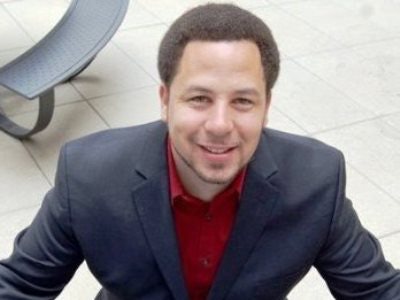As national tensions surrounding racial bigotry rise, Dr. J. Luke Wood, a professor of education at San Diego State University and an expert on the education of men and boys of color, is utilizing an academic approach to re-think solutions to systemic oppression.
 Dr. J. Luke Wood
Dr. J. Luke WoodStarting October 23, San Diego State’s joint doctoral program in education with the Claremont Graduate University will offer a public course titled “Black Minds Matter,” focusing on social scientific research surrounding the teaching of students of color, particularly Black men and boys. The class will feature a line-up of prominent guest speakers, including scholars and activists. About thirty students have enrolled, but as a public course, “Black Minds Matter” will exceed the limits of the Southern California classroom. There will be 150 live broadcast and replay sites with over 10,000 people who have registered for the course. Wood, an author of 14 books and more than a hundred other publications, emphasized both the immense scope and innovative goal of this graduate seminar.
Black Minds Matter was inspired by the Black Lives Matter movement and the academic research done on how educators and administrators can work against the disparities facing students of color. According to Wood, Black Minds Matter also owes a debt to a report of the same name published by The Education Trust – West, an education advocacy organization that uses data to argue for equity-based approaches to education.
“We’re not studying it as a movement, we’re taking principles of practice, those tenets, and we’re applying them in a real context to try to reach students and change the paradigm that we see,” Wood explained.
Plans for the class came to life after the shooting of Alfred Olango, a Black resident of El Cajon, California, a city just east of San Diego. In September 2016, Olango, a 38-year-old former refugee of Uganda, was shot several times by police after they mistook his e-cigarette for a gun. Olango’s sister had called the police earlier that day for emergency psychiatric services after observing some unusual behavior, but the two officers who arrived were not from the psychiatric emergency response team. Ph.D. students at San Diego State began mobilizing following the incident.
“San Diego was engulfed in marches and protests and other types of demonstrations, and the students were actively involved in that,” Wood said. “As part of the conversation we talked about the importance of showing how these same issues occur in education.”
Wood explained that he will organize the eight-week course around three themes of the Black Lives Matter movement: collective value, loving engagement and restorative justice. Wood said that the Black Lives movement disavows violence and teaches empowerment.
“I’ve said and I continue to say that education is a site for civil resistance through teaching that empowers,” Wood added. “And when people hear civil resistance I don’t know what comes to their mind, but for me our country has a long history of civil resistance.”
He said the course joins a tradition of sit-ins, vigils and marches to mobilize the classroom as a site for civil disobedience. Wood added that this publicly accessible course will have an unprecedented scope with the first half of the class being broadcast live.
“I’m using it more holistically to refer to teaching that basically addresses societal ills, which are the implicit biases and stereotypes and systemic racism that influences our education system,” Wood said, adding that the syllabus reflects his commitment to both rigorous scholarship and activism.
With guest speakers like Patrisse Cullors, a co-founder of Black Lives Matter, Ilyasah Shabazz, the daughter of Malcolm X and Dr. Betty Shabazz, and Dr. Frank Harris III, a colleague of Wood who specializes in the education of men of color, the course will include dozens of scholarly articles and books on student achievement, especially those focused on Black males. The students as well as those participating in the public course will be tasked with applying the lessons learned in Black Minds Matter.
“Maybe they’ll revise a syllabus to basically make it more welcoming. If they’re running a program, maybe they’ll make some modifications to the program that are attentive to what the research base says actually is effective,” Wood said. “If they’re a classroom educator, maybe they’ll be more intentional about validating their students and then documenting the process as they do it.”
The enrolled 30 students will have another assignment which includes creating briefs of recommendations that synthesize the information gleaned from readings and guest lectures.
“Ultimately, we can sit here and talk about principles of practice, we can talk about concepts, all day long,” Wood said. “But unless we are taking that and putting it into action, then we’re not really creating that civil resistance that’s necessary.”
Joseph Hong can be reached at [email protected]


















